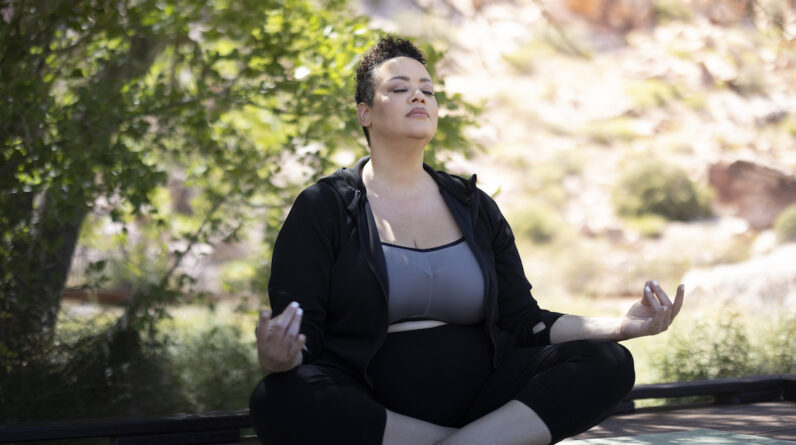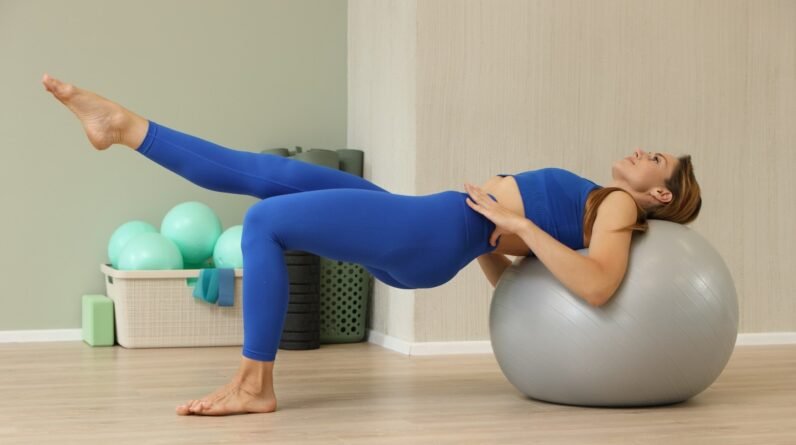
My “ah-ha” moment happened when I began doing Melissa Wood Health workouts. Melissa Wood-Tepperberg, creator of the platform, Pilates instructor and meditation teacher, typically ends each workout with a mini-meditation or moment of gratitude. It was the first time I had experienced a post-workout meditation outside of a yoga class, and it felt so good that I started meditating after every workout—be it a treadmill walk or strength-training session.
Experts In This Article
- David Rabin, MD, PhD, board-certified psychiatrist, neuroscientist, entrepreneur, and inventor, and co-founder & chief innovation officer at Apollo Neuro
- Josephine Atluri, author, certified life coach and an expert in meditation and mindfulness.
And guess what? The second I started viewing my workout and meditation as a two-for-one deal, I was much more likely to check both feel-good practices off my to-do list.
“I’m a big proponent of habit stacking and recommend it when [people] have difficulty incorporating a new habit into their routines,” says Josephine Atluri, a meditation and mindfulness expert and the host of the podcast Responding to Life: Talking Health, Fertility, and Parenthood. “If you’ve dedicated the time to work out, then tacking on a one- to five-minute mindfulness meditation post-workout is a great way to start building your mindfulness habit. The best part is that it also serves a pleasant cooldown, much like savasana after a yoga session.”
The best thing about post-workout meditation is that you don’t need to devote a huge chunk of time to it in order to reap the benefits. Dave Rabin, PhD, MD, a neuroscientist, psychiatrist, and the co-founder of Apollo Neuroscience, says the sweet spot to aim for is two to five minutes—a realistic and manageable duration.
“Adding a meditation or mindfulness practice onto a workout, even if it’s just a couple minutes, can be very beneficial for overall recovery,” he says.
Curious about how a post-workout meditation can benefit your physical and mental health? Keep reading for everything you can look forward to.
3 benefits of post-workout meditation
1. It helps combat the physical stress of a workout
Working out—no matter if you’re weightlifting or doing heart-pumping cardio—can put stress on your body. A post-workout meditation is a quick way to bring everything back to balance.
“If you think about what a workout or intense exercise experience is doing to the body, it puts us into what’s called ‘hormesis’—a state where our bodies are exposed to stress that is controlled and in a safe environment,” says Dr. Rabin. “After we experience the physical stress of a workout, our heart rate, blood pressure, and breathing rate are all high, and our bodies are perceiving a stressed environment. So, the faster we can recover from that stress, the more resilience we build in our bodies and the better we feel afterward.”
According to Atluri, meditating after a workout helps promote relaxation and enhances overall well-being. “It allows you to transition from physical activity to a calmer mental state,” she says.
“Adding a meditation or mindfulness practice onto a workout, even if it’s just a couple minutes, can be very beneficial for overall recovery,” —Dr. Rabin
2. It aids in recovery
Dr. Rabin is a huge fan of how effective post-workout meditation is in helping with recovery. “It accelerates the calming down of the body, aka the recovery of the body,” he says.
Atluri agrees, saying the expedited process occurs by reducing the levels of stress and inflammation experienced by the body during exercise.
“Inflammation can occur during exercise, which we feel later as muscle stiffness or pain,” she says. “Mindfulness meditation has also been shown2 to help reduce inflammation in the body, which helps with overall recovery.”
3. The feel-good vibes last for hours
Post-workout meditation is the gift that keeps on giving. Whether you work out in the morning or evening, taking the time to ground yourself can result in a sense of calm that allows you to flow through your day feeling balanced and doze off at night with greater ease.
“A general slowing of our thoughts calms the body, reduces anxiety, helps us sleep better3, and helps us focus better and have better concentration during the day,” says Dr. Rabin.
How to prepare for a post-workout meditation
Before you begin your post-workout meditation, create a calming environment. Dr. Rabin recommends surrounding yourself with soothing, low lighting and calming meditation music. And if there are other tools that help calm your body and serve as a reminder that you’re safe, go for it.
“[You want to be] calm enough to enter a meditative, peaceful, quiet mind state,” he says.
Also, keep things as screen-free as possible, opting for an audio-based meditation app (there are some great free picks here) that isn’t distracting to your practice.
While an ultra-chill environment is the goal, it’s not always going to happen. Maybe you’re at the gym, where fluorescent lighting and loud noises are a given. Distractions are common at home, too, like a barking dog or traffic outside your window. The good news is, no matter what environment you’re in, taking a few minutes to meditate is still going to do your body and mind good.
“My biggest tip for anyone trying out meditation is to go into it without any expectations,” says Atluri. “When you walk into an experience with a list of things you expect to achieve during the session, it can feel defeating when they aren’t accomplished. Mindfulness meditation is about being present in the moment with an open curiosity supported with grace and self-compassion. Thus, you can’t predict what will happen in that present moment. The act of just being present during that post-workout meditation and seeing what happens is the big win.”
Ready to get started? Try this post-workout meditation
You can choose any meditation you’d like to enjoy post-workout, whether that’s using an app on your phone or pulling up a YouTube video. But if you’d like to meditate along with Atluri, she provided the step-by-step instructions below.
One thing to note: If you have a million thoughts racing through your mind during your meditation, that’s okay.
“Your mind will never be completely empty of thoughts,” she says. “Thoughts will happen. Instead, try to flow with your thoughts, witnessing them, acknowledging them, and then returning back to your point of focus.” Which, in this case, is your breath. Ready to get started?
- Set a timer for your meditation. There’s no right amount of time. You can still reap the benefits of meditation by practicing for just a few minutes each day and gradually building up over time.
- Start by either lying down or sitting upright in a cross-legged position. It might feel more restorative to lie down after a workout so you can give your body a chance to fully relax.
- Close your eyes and take a moment to witness any sounds and to feel the ground beneath you. How is your body feeling in this moment?
- Settle into your body and space by slowing your breathing.
- Breathe into your nose and feel your belly fill up with air.
- Exhale slowly out of your nose and feel your belly go inward.
- Repeat this process of intentional breathing knowing that each breath is bringing you to a calmer state of being, both physically and mentally. Your breath is your point of focus for this mindful meditation.
- When you hear the timer, before opening your eyes, say a gratitude to yourself and your body for putting in the work and caring for oneself.
- Open your eyes and slowly move out of your meditation position.
Well+Good articles reference scientific, reliable, recent, robust studies to back up the information we share. You can trust us along your wellness journey.
- Basso, Julia C et al. “Brief, daily meditation enhances attention, memory, mood, and emotional regulation in non-experienced meditators.” Behavioural brain research vol. 356 (2019): 208-220. doi:10.1016/j.bbr.2018.08.023
- Creswell, J David et al. “Alterations in Resting-State Functional Connectivity Link Mindfulness Meditation With Reduced Interleukin-6: A Randomized Controlled Trial.” Biological psychiatry vol. 80,1 (2016): 53-61. doi:10.1016/j.biopsych.2016.01.008
- Rusch, Heather L et al. “The effect of mindfulness meditation on sleep quality: a systematic review and meta-analysis of randomized controlled trials.” Annals of the New York Academy of Sciences vol. 1445,1 (2019): 5-16. doi:10.1111/nyas.13996







